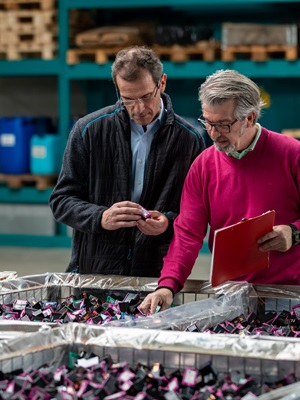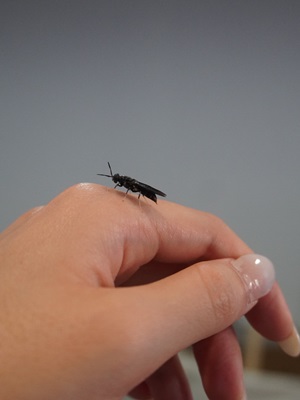In 2023, humans consumed a staggering 318 metric tonnes of meat. That’s roughly four times the amount that was eaten in the 1960s. According to some projections, that number could climb over 500 million metric tonnes by the year 2050.
That quantity is simply too high for the planet to sustain. Regardless of your stance on the ethics of eating animals, the reality is that the meat industry is responsible for 14.5 percent of mankind’s greenhouse gasses. Kilo for kilo, beef produces 20 times more greenhouse gasses and requires 20 times more land area than beans or other plant-based proteins.
Factory farming in particular leads to a host of other problems, from water contamination resulting from animal waste to antibiotic-resistant bacteria strains that flourish when animals are forced to live in cramped, inhumane conditions. These farms also emit nitrous oxide and methane, which the CDC found can be 300 times more damaging than carbon dioxide with regards to global warming.
Although no one expects the whole world to go vegan, scientists are advocating a more sustainable global diet rich in plant-based proteins. For the last couple of decades, tech companies have been searching for solutions to make that possible.
The Shifting Role of Meat Consumption Through Human History
Part of the world’s rising meat consumption can be attributed to population growth, but much of it is tied to changing dietary habits. While plant-based diets have been around since the dawn of human civilization, for most of history, the majority of humans have eaten animal products. The key difference is that they just did not eat so many of them.
For the most part, this had more to do with pragmatic considerations than humanitarian or environmental ones. Raising animals required more time and land resources, something small farming families were notoriously short on.
As a result, humans came up with remarkably ingenious ways to coax flavor out of every part of an animal. Bones were transformed into stocks and fatty cuts were cured and used in small quantities to enhance whole dishes. With the arrival of industrialized farming, however, meat became the center of virtually every meal.
China, for instance, relied on a diet of largely grains and vegetables, with small amounts of pork used almost as a flavoring agent. By 2021, the country consumed nearly 100 million metric tonnes of meat, mostly pork, making it the world’s largest consumer. And there’s still room for that to increase; the average American consumer eats twice as much meat as the average Chinese one.
While part of this can be chalked up to the fact that many people enjoy the taste of animal products, a large portion has to do with the way in which big agribusinesses have marketed them. Meat has been marketed as a symbol of prosperity, of attaining a certain lifestyle. In 1928, U.S. President Herbert Hoover ran on the campaign slogan, “A chicken in every pot!”
How Tech Is Transforming the Veggie Burger
From tofu and tempeh to rice and beans, the planet already has plenty of plant-based protein options. The reality, however, is that many people who are accustomed to eating meat are often reluctant to give it up.
Enter an increasingly sophisticated array of alternatives. In 2016, both Impossible Foods and Beyond Meat launched. Unlike the crunchy, pallid veggie burgers of yesteryear, both products bore a respectable resemblance to ground beef. They sizzled, they retained moisture, and they even appeared to “bleed.” The initial response was overwhelmingly positive, with Impossible Burgers even replacing beef patties at Burger Kings in dozens of countries.
As a few years went by, however, enthusiasm for both products waned, in part because consumers still thought they just weren’t a match for the real thing. Now, some tech startups are looking into a somewhat unorthodox approach: adding animal fat.
In an interview with The Washington Post, Ed Steele, the founder of the London-based startup Hoxton Farms, said, “While people do want to change the world and want to live sustainable lives, ultimately, at the end of the day, people only want to do that when they’re able to eat the products that taste really good.”
Steel’s company is growing pork fat from cell cultures, then using that real lard to enhance the mouthfeel of plant-based meats. It’s a similar approach to Mission Barns, a U.S.-based startup, which is using the same lab-grown pork fat to give its otherwise plant-based sausages and bacon a better texture. Lab-grown meats have already been approved for sale in some markets. Although the resulting product is not strictly vegetarian, it still has a drastically lower carbon footprint than beef or pork, plus no animals were harmed in its production.
Searching for A.I. Solutions
Some companies are looking beyond human intelligence for out-of-the-box plant-based solutions. Climax Foods, a U.S.-based biotech firm started by an astrophysicist, has harnessed the power of A.I. to engineer a synthetic version of casein, an animal protein in dairy. The result is a plant-based cheese that melts and stretches like the real thing. The product is so compelling that it’s showing up everywhere from the triple-Michelin-starred Eleven Madison Park in New York to products by juggernaut Kraft Heinz.
Meanwhile, Meati Foods teamed up with PIPA, an A.I. innovator, to help work on its meat-substitute based on mycelium, the subterranean root-like network that connects mushrooms. The hope is to better be able to fully explore the nutritional benefits these mushroom meats can offer diners.
At the end of the day, no one scientific breakthrough is going to fully overhaul the world’s dining habits. What’s important to remember, though, is that for the health of the planet, reducing meat consumption is not a zero-sum game. Every incremental change matters here. If these startups can help shift broader narratives about the role of animal products in our diet, that in and of itself is a victory.
Posted 09/08/2024

















